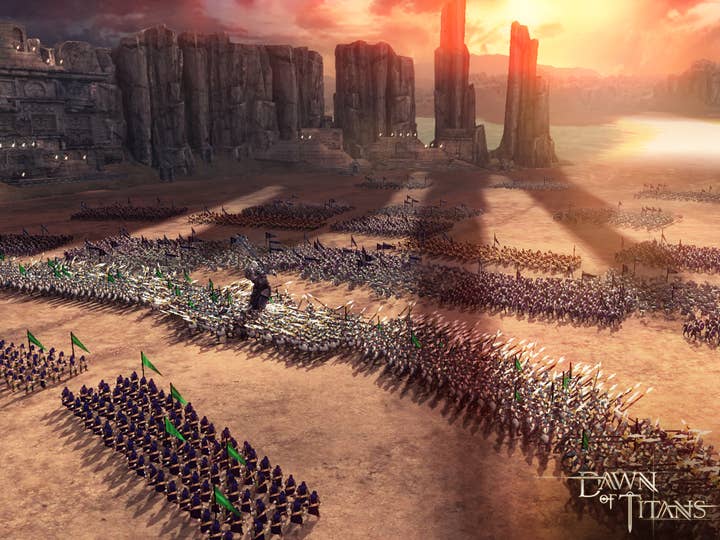Putting the Zing Back into Zynga
NaturalMotion's Torsten Reil on his role at the helm of Zynga's mobile flagship
If there's a lot of pressure on the shoulders of Torsten Reil at the moment, and it's hard to imagine how there wouldn't be, you'd never know it from talking to him. Reil is relaxed and self-assured - speaking with the confidence and knowledge of day-to-day operations indicative of a leader with his hands firmly on the wheel and his eyes sharply on the details. It's a busy time - his team has two high-profile mobile games on the way: the first, big budget strategy Dawn of Titans, is already in soft launch. The second, CSR Racing 2, bears the weight of even greater expectations.
The original CSR was made for NaturalMotion by Boss Alien in 2012. Boss Alien, crewed by a team of racing specialists led by several of Black Rock's leading lights, absolutely nailed the one-button gameplay and slick presentation whilst NaturalMotion layered on scaled support and clinically effective monetisation. That combination saw the game downloaded 2.5 million times in its first weekend, building to a monthly revenue of $12 million not long afterwards. Unsurprisingly, given the successful nature of the collaboration, Natural Motion quickly acquired the smaller team.
Less than 18 months later, and following a 10 million download opening week for NaturalMotion's next game, Clumsy Ninja, Reil found himself on the other end of an acquisition, as Zynga laid out $527 million for his team. Now, he was suddenly part of a much bigger empire, one that was cash rich but struggling to adapt to the exponential decline of Facebook gaming. With the glory days of the 'Ville series behind it, Zynga laid off 15 per cent of its staff on the same day it announced the acquisition. Year-on-year revenues were down 43 per cent and then-CEO Don Mattrick's expectations were very firmly on mobile to bring them back up. Time to step up.

By the beginning of 2015, 60 per cent of Zynga's income was from mobile games, with CSR's earnings still playing a considerable role. Now, a target has been set for mobile to comprise 75 per cent of Zynga's total revenues by the end of Q4, 2015 and the work of Reil's team is expected to be making a hefty contribution. Luckily, early signs from Titans are healthy.
"We're seeing very high monetization of the game, the very highest that we've seen of any game," he says between cautious sips of coffee, allowing himself a brief smile as he adds "so, that's obviously encouraging."
"Other than that, I probably can't say too much more than we've obviously spent a lot of time on it. This is kind of a big thing that we're dealing with right now."
With CSR having done so well, and to still be earning so long after release, I'm was somewhat surprised to find that the sequel is being made by a new team in London, rather than Brighton's Boss Alien. Reil gives a two-pronged explanation.
"This game is more than three years old, and it's ended up having much more longevity than we expected. That's down to the Boss Alien team really driving new features in the game, being extremely systematic in how they do that"
"The first reason is that CSR 1 is actually more than ticking over, it's actually in quite, quite deep development still, and you can see this in the revenues of the game as well. This game is more than three years old, and it's ended up having much more longevity than we expected. That's down to the Boss Alien team really driving new features in the game, being extremely systematic in how they do that. They've really embraced some of the Zynga best practices in terms of how to bring in new features and how to prioritize them, together with creativity, production values, the best you would get in Britain. I think Britain is one of the few countries where you can really get that at the highest level, and when you combine that with really good product management, you can be successful.
"There's another reason, and I can't say too much, but they're working on something else, which is very cool and they're very passionate about. We wanted to give them the opportunity to work on it, because they deserved it for the success of CSR 1. At the same time, we were also looking to build up resource for CSR2, which we've done now here in London under Julian Widdows. And those teams work very closely with each other, and you'll see that in the art style of the game. You'll see that in the consistencies that come across between one game or the other. Julian and Jason work very closely with each other. It's taken us a little bit of time to get to a really, really high quality studio, but Julian's done an amazing job putting those people together here in London."
Talking to Reil about building UK studios, using high-profile developers and top-level talent, brings to mind some conversations I've had with various investors, developers and analysts from overseas. I've been surprised to learn that there is something of a perception from some US and Asian companies that UK mobile development is not a good prospect - not because of any lack of quality, but because teams tend to be formed of staff who've come from the upper echelons of larger firms, working with big console budgets, who expect big salaries. I put it to Reil that he could have presumably built a new studio for less elsewhere.

"I think good people can command good salaries," he says emphatically. "That just falls down to the quality in this country. I think overall, salary levels are okay. I think it's important that people in this industry can live in this country and get a favourable return for their work. Like you said, the challenge is very high. I think if there was just a level of expectation that came from having done console games, I think that is not a good reason for the money or high salary.
"But that kind of thing sorts itself out, right? Because people would just not be paid if they don't create the quality. If you're on the flip side, look at, let's say a small studio--I'll just make something up--of twelve people. Each one gets a pretty decent salary, development costs are not that cheap, but if you know that this is a studio that's worked together for the last, let's say, five to ten years, it's pretty likely that they'll be able to develop a game at the spec to a quality much more cheaply than anybody else in the world.
"That's because the efficiencies of having worked together for a long time, having experience, is so high, I wouldn't underestimate it. Like I said, we've built up a whole bunch of teams now in the past, and we obviously got there in the end, but it takes a while. So, getting the team that's already working well together--and there are quite a lot of them in the UK--is very valuable. So maybe, per head [it's more expensive], but in terms of overall effectiveness, the teams are very good here."
"I think it's important that people in this industry can live in this country and get a favourable return for their work."
The very fact that CSR has a sequel (along with CSR Classics) is another reason it's noteworthy for NaturalMotion, a company who hasn't retrodden much ground. The high-intensity strategy of Titans is a particular departure, I note - what gives Reil and his team the confidence to step into such unknown territory when so much is riding on it?
"We tend to not always do the same genre. We don't just do racing, we don't just do horse simulators, which is how we started, but we haven't done a My Horse 2 yet. But, the reason we're doing it in the first place is that we only do it if we believe there is a big opportunity, if we believe that we can do things differently in a particular genre, otherwise you would never go into it.
"If you go into a new genre, you've got to be super careful to A) learn the genre really quickly, and B) get the right people to help you seek that out. The team that we have now, that runs the Dawn of Titans game franchise, it's a mid-core gamer team of absolutely, super experienced people. We hired some of the best people in the mobile industry from mid-core, and we hired some of the best designers, actually from the PC industry, that have been doing hardcore access strategy for ages. So, you have to have all of that, and then you have to combine all of that with analytics, and analytics is something that is applicable across the range - you have some areas in gaming that, even though the genre's different, some of the core fundamentals actually are transferable between games. That kind of takes a little bit out of the fear, I guess, when moving to a new genre."

We talk for a little while about the marketplaces where both Titans and CSR 2 will launch - the genres they'll be slotted into and how crowded they are, not always with games that necessarily fit the category description. Getting noticed amongst that small leaderboard is difficult enough, but what of the grander scale, the holy grail of F2P development, the Top Ten Grossing chart? With so many long-term residents, is that honour roll now a closed shop to Reil?
"The issue specifically is that there is a positive feedback loop," he says. "If you are a well-performing game in terms of monetization, you're able to buy new users. You advertise and you can do that alright, positively, so the LTV of the game is higher than the CPI. But the beauty when you're in that position is that you buy those users in, you get more data from those users, and you can actually optimize your LTV, so you can have that creep slighter higher up, that means you can afford to spend a little bit more, which in turn means you can get more users in, which in turn means you can drive your LTV up.
"So you end up in this positive purchase cycle, so that makes it really hard for anyone to get into it, and that's the thing where we're seeing right now, is that the top-grossing games are all in that state, have kick-ass user acquisition teams, incredibly good game monetization teams, and they just work hand in hand to drive the LTV and the CPI up. So anyone who is not in acquisition and doesn't have a huge amount of data, would just find it very hard to break in, and then people are surprised when they see the LTVs for some of the games. They are so much higher than a standard feature playing game that I know some companies I've spoken to, teams almost want to give up, because they think, how are we ever going to get to an LTV like that?
I mean, that's the trick. It's almost all about the LTV of the game, it's less about the CPI. The CPI is just a function of the LTV, fundamentally"
"And I mean, that's the trick. It's almost all about the LTV of the game, it's less about the CPI. The CPI is just a function of the LTV, fundamentally, right? So, then the question is, how do you solve that?"
Is it, I ask, something that Apple and Google should be interfering with? Would a little regulation and weighted promotion from platform holders to stir the pot mean a healthier ecosystem?
"I don't think, personally, there's much that the platforms can or necessarily should do about it at this point," answers Reil. "You know, I've thought differently about it in the past, but it's actually very hard to regulate this in a way that stays fair, because it needs to be a free market, and sure, every market needs to have rules, but it is just really advertising, right? What's happening is that the big advertisers are getting the bigger gains, and the smaller companies have a problem.
"So the only way to solve it is by getting your LTV where it needs to be, and that means you understand the monetization of your game, or you have a game that's so organic that you don't need to do a lot of these acquisitions. So, if you look at Clumsy Ninja, Clumsy Ninja drives so many organic downloads all the time, we don't really have to worry about this acquisition. That's great, but usually that isn't the case. Usually, you have to discipline these acquisitions, and then you have to get your LTV where you want it to be, or you have a user acquisition team that is able to just optimize so much, that yes, maybe your LTV isn't as high as other games, but your effective CPI is lower than what other companies are buying. I think this trend will continue, to cut a long story short."

